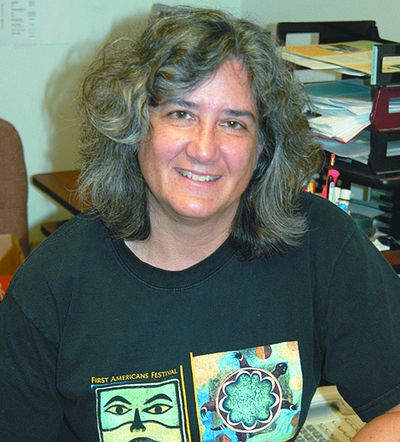She gives youths new outlook on life

The youth group she leads at Covenant Christian Church is different from the one Edie Rice-Sauer grew up in, and the ones she led in college and seminary.
Seven years ago, when her children – Sophie, 18 and Josh, 24 – were young, Rice-Sauer became youth leader at the Disciples of Christ church, where her husband, Michael (“Redhawk”), is pastor.
“I’m probably too old to do youth work, but it feeds my soul, and I think I feed the kids’ hearts,” she says. “I do it partly because it was done for me and made a difference in my life.”
But there’s a big difference in the youth she sees today, Rice-Sauer says.
“When I was going to Christian Youth Fellowship before I graduated from high school in 1975 in Massillon, Ohio, most of my peers came from fairly stable, economically solid two-parent homes,” she says.
“Those who didn’t, didn’t come to church, at least not to my middle-class church home in middle America.”
In contrast, several of the youths coming to Covenant’s group are from formerly homeless, single-parent families that have participated in the church’s Voiceless Choir.
Some are foster children who move from home to home and still come even if they have to make several transfers on the bus.
“Most haven’t done band, choir or Scouts, because their mothers are abuse victims, their families are homeless, or someone at home has a disability. Group experiences cost more money than they have,” Rice-Sauer says.
“Basic life skills are often lacking: Some don’t know how to properly address an envelope. Passing food around a table doesn’t occur to them unless I suggest it. … Starting a fight is an honorable conflict resolution solution in their minds.”
Among the five to eight youths who attend the group, she says, “trusting an institution isn’t on their radar.”
“Some have no money, so activities a youth group might do – ice skating, going to a camp or visiting a theme park – are out of their reach. It limits who can come.”
Some activities relate readily.
Before the CROP Hunger Walk this year, the group set up a tent, a water faucet and a bucket to learn about water use and life in a refugee camp.
At Halloween, the church’s youth prepare a scary house with creepy music and smoke machines at Zephyr Camp and Conference Grounds and invite other youth groups in the region.
Rice-Sauer has wrung her hands, wishing for the good old days she realizes probably never were.
She worked in youth ministry at her home church in Massillon and during her time at Hiram College in Ohio, where she graduated in 1979 with a bachelor’s degree in psychology.
In Nashville, Tenn., where she earned a master’s of divinity in 1984 at Vanderbilt Divinity School, she was an education specialist at Planned Parenthood and director of a domestic-violence shelter.
After moving to Spokane in 1993, Rice-Sauer worked as a county mental health planner and as development director at Volunteers of America, where she wrote grants for the Crosswalk program for street teens.
At the end of this month, she begins as program director at the Women’s Hearth, a drop-in center for women in downtown Spokane.
From her work at Volunteers of America, Rice-Sauer has picked up the idea of being “strength based,” using the Positive Youth Development philosophy.
“We celebrate successes and accomplishments, especially as they join efforts to give back to the church and community, such as sending cards to shut-ins or participating in community service,” she says.
For youths who experience inconsistency elsewhere in life, simple, experiential activities provide valuable lessons, Rice-Sauer says. For example, she often cooks with Covenant’s youth group and has them set the table together, sit down and pray before the meal.
“These family-type activities provide training and build community,” she says.
The group also needs to be a safe place for youth to share about their lives and concerns. Rice-Sauer assures them what is said in conversations stays there, unless it’s a danger to themselves or others, and she discourages gossiping.
“When I see a youth open up in the group about issues in their lives, I know it’s worth it and I know that creating a safe place – a home – can happen at church and change someone’s life,” she says. “It changed mine.”